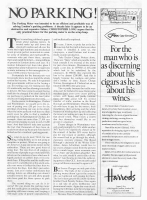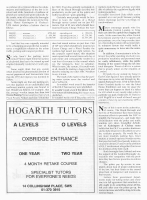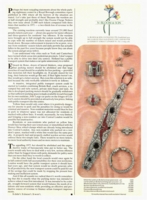No Parking!
London Portrait Magazine — September 1983
The Parking Meter was intended to be an efficient and profitable way of solving London's parking problems. A decade later it appears to be an obstructive and expensive failure. CHRISTOPHER LONG argues that the only practical future for the parking meter is on the scrap heap.
By Christopher Long
 There's something sublimely appropriate about parking meters. In serried ranks up and down the streets of London and all over the world their rigid stantions and mechanical heads provide perfect memorials to a similar army of mindless and mechanical bureaucrats who put them there, operate them and watch them fail - losing millions of pounds in London alone each year. If a nuclear holocaust ever does take place I suspect they alone will survive in rigid rows as mute testimony to the unimaginative lunacy of 20th century bureaucracy.
There's something sublimely appropriate about parking meters. In serried ranks up and down the streets of London and all over the world their rigid stantions and mechanical heads provide perfect memorials to a similar army of mindless and mechanical bureaucrats who put them there, operate them and watch them fail - losing millions of pounds in London alone each year. If a nuclear holocaust ever does take place I suspect they alone will survive in rigid rows as mute testimony to the unimaginative lunacy of 20th century bureaucracy.
Fortunately for the bureaucrats very few people know just how stupid the whole system has become. We take it for granted that governments will tax us for buying a car, for owning a car, for making sure that it's roadworthy and for allowing us actually to drive it. We have come to accept that we shall also be charged if we don't drive it: if we just leave it parked on the road (after all you can't hang it from the trees).
Furthermore, in Kensington, Chelsea and Westminster, we usually go to the extent of paying over £50 per year for the privilege of parking our cars in the street, when we know perfectly well that we often won't even be able to find a resident's parking bay. In Kensington & Chelsea, for example, there are more than 27,500 cars with permits hoping to park in only 19,200 bays. And that doesn't take into account the fact that thousands of bays have already been taken up by people who haven't forked out for a resident's parking permit.
 So, what do we do next? Well, for one thing, being British, we're not going to complain or protest. What we are going to do, however, is pay out some money to the authorities. There are two good ways of doing that. We can first of all employ a small army of people to go round and stick tickets on the windows of cars which are illegally parked on yellow lines or in residents bays. If the police and the traffic wardens aren't at all efficient at this and it actually costs more to collect the fines than we earn from the fines, then that's just unfortunate. Just as it's rather unfortunate that sticking tickets on offending cars doesn't actually remove the cars and allow people who have paid for those spaces to park there.
So, what do we do next? Well, for one thing, being British, we're not going to complain or protest. What we are going to do, however, is pay out some money to the authorities. There are two good ways of doing that. We can first of all employ a small army of people to go round and stick tickets on the windows of cars which are illegally parked on yellow lines or in residents bays. If the police and the traffic wardens aren't at all efficient at this and it actually costs more to collect the fines than we earn from the fines, then that's just unfortunate. Just as it's rather unfortunate that sticking tickets on offending cars doesn't actually remove the cars and allow people who have paid for those spaces to park there.
The second thing we can do is inspired! We can invent the parking meter and this really gives us amazing scope for spending still more money and keeping a still larger army of people unproductively and ineffectually employed.
It's easy, I know, to poke fun at the bureaucrats but the truth is that even when a meter is installed it costs us, the ratepayers, a small fortune and is manifestly counter-productive.
Take Excess Charge Notices alone. These are 'fines' which are payable to the local councils if we overstay at the meter for just a few minutes. Westminster alone made a net loss in 1979/80 of £152,280 which had to be subsidised by the ratepayers. In 1980/81 they expected this loss to be almost £200,000. And this is largely because the wardens and police don't bother to issue Excess Charge Notices, Kensington & Chelsea lost an estimated £20,000 in the same year.
 This is partly because the traffic wardens can't be bothered to issue them (some wardens don't even carry excess parking notices with them) and partly because there are only about half the correct number of traffic wardens in the Royal Borough and Westminster. Thus the councils who have to pay for the meters, their installation, their servicing and the whole business of winding them up and collecting the money are asking us to pay for a system that doesn't work. What's more, a system that they themselves would like to see grossly re-organised.
This is partly because the traffic wardens can't be bothered to issue them (some wardens don't even carry excess parking notices with them) and partly because there are only about half the correct number of traffic wardens in the Royal Borough and Westminster. Thus the councils who have to pay for the meters, their installation, their servicing and the whole business of winding them up and collecting the money are asking us to pay for a system that doesn't work. What's more, a system that they themselves would like to see grossly re-organised.
Excess charges in Westminster were only paid promptly by 23% while another 39% had to be expensively chased up by the council. A further 38% never had to pay for one reason or another, although the council had to go through the whole, expensive recovery process. The Royal Borough's chairman of the Works Committee, James Arbuthnot, would love to see excess charges raised from the present £4 to a much larger, more economic sum – or better still abolished altogether. But what, he asks, would it cost to alter all the meters? And bearing in mind the suffocating powers of the GLC, how on earth could you get all those concerned to agree to it?
But Excess Charges are only part of the story. The bulk of the revenue from parking meters doesn't go to the councils who are lumbered with paying for them. The lion's share goes to the courts via those familiar Fixed Penalty Notices. Here again is a sad tale of gross inefficiency and phenomenal waste. Again the costs of collecting the £10 fines turn the revenue generated into a monumental financial farce.
Because Fixed Penalties are regarded as evidence of a criminal offence the whole majesty and inefficiency of the law is invoked and while hundreds of millions of pounds are earned and spent nationally by the courts, none of it reaches the boroughs who have to finance the meters in the first place. Hence Kensington & Chelsea's 5,131 meters produce a balance sheet as follows:
- 1981/82 revenue — £729,483 — operating cost £993,126
- 1982/83 revenue (est.) — £850,300 — operating cost (est.) £1,239,340
- 1983/84 revenue (est.) — £1,100,300 — operating cost (est.) £1,357,250
 And that loss was originally intended to be a thumping great profit that would finance a magnificent solution to the urban traffic, parking and transport problem.
And that loss was originally intended to be a thumping great profit that would finance a magnificent solution to the urban traffic, parking and transport problem.
So why hasn't the parking meter worked? Some might think that a piece of clockwork that has to be wound up and emptied manually would never work anyway.
Some might think that any system which involves the phenomenal amount of wasted paperwork and bureaucratic time that the 1972 Act imposes was doomed to failure.
Some might say that any parking system that depends on an understaffed and inefficient warden system was bound to fail. Would you believe, for example, that the average warden issues less than two Excess Parking Notices and less than seven Fixed Penalty Notices each day? (Statistics for 1981). Even the normally restrained officers of the Royal Borough describe this productivity on the part of the police and traffic wardens as 'quite appalling.'
 Certainly most people would be horrified to learn the results of a Royal Borough survey carried out on just 471 meters. Out of 63 cars which should have incurred Excess Charge Notices the wardens had issued notices on just four. Out of 149 cars which should have incurred an Excess Charge and a Fixed Penalty the wardens had issued just eight notices. As the council's report states, this situation must repeat itself several times each day at each meter and consequently results in a vast loss of revenue to the council which we, the ratepayers, have to subsidise. What is more, the system, if it could work at all, should be making a huge profit and thereby reducing our rates bills. Needless to say, it is not.
Certainly most people would be horrified to learn the results of a Royal Borough survey carried out on just 471 meters. Out of 63 cars which should have incurred Excess Charge Notices the wardens had issued notices on just four. Out of 149 cars which should have incurred an Excess Charge and a Fixed Penalty the wardens had issued just eight notices. As the council's report states, this situation must repeat itself several times each day at each meter and consequently results in a vast loss of revenue to the council which we, the ratepayers, have to subsidise. What is more, the system, if it could work at all, should be making a huge profit and thereby reducing our rates bills. Needless to say, it is not.
The truth of the matter is that the parking meter system never has worked and never will work.
It wouldn't work even if the lunacies of the GLC bureaucracy were abolished.
It wouldn't work even if the labour intensive system of maintaining the meters were abolished.
It wouldn't work even if the police and the wardens took the issue seriously and were able to enforce the regulations legally with realistic penalties.
It wouldn't work even if the whole system operated at a vast profit because parking meters encourage just the very things we can do without.
Meters encourage people who live outside Central London to bring their cars into the capital thus clogging the roads. At the same time they allow Central Government and the GLC to ignore and procrastinate over the long-overdue matter of providing London with a proper public transport system that would make it quite unnecessary to drive into the centre at all.
In addition, if monetarism is to be believed, the public spending involved in unproductive machinery and personnel must be vastly inflationary, while the public flouting of the system brings the law into total disrepute. Worst of all it is a system that is grossly unfair on the residents of London.
If I park my car outside my house in Earls Court Square I have already paid for that space in my rates and through my Residents Parking Permit. If Mr & Mrs Smith from Croydon decide to visit the Ideal Home Exhibition and take my space the worst that can happen to them is a ticket for £10 which is very nearly what a day in a private car park would cost. If I have to park illegally as a result of them I may get a ticket or have my car towed away (£55 to recover it).
None of this is news to the authorities, of course. The Royal Borough and the City of Westminster have been making strenuous efforts to persuade the GLC to simplify the bureaucracy, and made their dissatisfaction with the police and traffic wardens very clear, Councillor Arbuthnot of Kensington & Chelsea states baldly that the GLC is a positive hindrance and no help whatever in his efforts to serve the residents properly. He would like to see more residents parking bays, fewer meters; a council operated warden service that pays for itself; fixed penalty notices increased to about £25 and even the abolition of GLC involvement altogether if not even the abolition of the GLC itself.
Both boroughs have lobbied and won the support of the London Boroughs' Association who sympathise with the problems they face but are powerless to enforce changes.
The police pay lip service to complaints about lack of proper enforcement of the law, but their letters to the council plead lack of manpower and resources as their excuse.
Letters from government departments make tut-tutting noises and everyone is in full agreement that somebody really ought to do something about all this, but year after year the prices go up, the meters increase and still no long-term solution has begun.
Perhaps the most revealing statements about the whole parking nightmare comes in a Royal Borough committee report published in 1981 where all the horrors of the situation are stated. Let's take just three of them! Because the wardens are at half strength and probably don't like Excess Charge Notices they now issue about 23,000 such tickets compared with three times that number in 1971 – a two-thirds loss of revenue to the ratepayers.
The existing wardens currently issue around 251,000 fixed penalty tickets each year – about one quarter for meter offences and three-quarters for residents' bay offences. If the wardens were brought up to full strength the system would not be able to cope with the number of tickets issued and would probably break down. Because enforcement is known to be so poor, revenue from residents' season tickets and daily permits has actually fallen in the past five years because people know they can abuse the system and get away with it.
I can understand why cities such as York and Canterbury have turned whole areas into pedestrian precincts. I don't expect to be able to drive into their city centres. Holland has a public transport system that makes a car quite unnecessary to a visitor.
Edward de Bono, doyen of lateral thinkers, once proposed that parking meters should be abolished and that large stretches of road should be available for free parking – provided that motorists left their headlights on. If people stayed for too long, their batteries would go flat and, if their lights weren't on, they would get a ticket anyway. But even this solution is no solution because the only workable solution is surely as follows:
A massive, integrated public transport system could be started in London combining British Rail, coach services, a revamped bus and tube system, private mini-buses and taxis. As this is developed parking meters should be gradually withdrawn so that sufficient parking space is made available in each borough for its own residents, free. Large car parks on the fringes of Central London should be provided at attractively low prices, linking with public transport into the centre.
Yellow lines would only exist where it is positively dangerous for anyone to park and the penalties for doing so would be criminal and massive. Non-resident motorists would then be free to park in whatever space was not allocated for residents or marked with yellow lines. It would, necessarily, be very limited, and bringing a non-resident car into Central London would be possible but unattractive.
Residents or non-residents who parked on yellow lines would face having their cars towed away or immobilised with the Denver Shoe wheel-clamps which are already being introduced into Central London. Any non-resident who parked on a resident's space, marked with a white line, would face the same penalty. A properly laid and properly staffed warden service would enforce these two simple rules. There would be no more tickets, no more local authority losses and no more meters to maintain.
The appalling 1972 Act should be abolished and the unproductive waste of bureaucratic time put to better use. The courts would only have to deal with a very few, serious offences rather than be bogged down with petty demands for paltry sums that cost more than they're worth to collect.
On the other hand the local councils would once again be in full control (with full accountability) for their own territories. London would have the public transport system it should have had years ago, and that system would no doubt generate jobs. In all productivity the new transport system could be paid for out of the savings that could be made by stopping the present loss-making and inefficient system.
And if this all sounds too radical then it's worth remembering that this is exactly what the parking meter was intended to achieve when it was first introduced. It was intended to be a simple, straight-forward system that would balance the needs of residents and non-residents while providing an effective and productive source of revenue to finance urban transport improvements.
It didn't. It doesn't. It won't.
© (1983) Christopher Long. Copyright, Syndication & All Rights Reserved Worldwide.
The text and graphical content of this and linked documents are the copyright of their author and or creator and site designer, Christopher Long, unless otherwise stated. No publication, reproduction or exploitation of this material may be made in any form prior to clear written agreement of terms with the author or his agents.
















